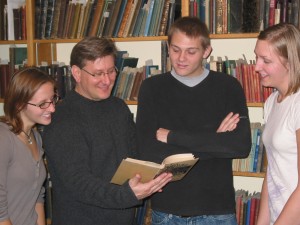
The Max Kade Institute for German-American Studies (MKI) has been named the recipient of a prestigious National Endowment for the Humanities (NEH) Challenge Grant to support the MKI Library Project.
The award, which provides the Institute with $300,000 to be matched over the next four years on a three-to-one basis, will go toward an endowment for a librarian/archivist position, the remodeling and renovation of the MKI’s new quarters in the University Club, and the purchase of new acquisitions.
NEH Challenge Grants advance knowledge and understanding in the humanities by strengthening the institutional base for humanities teaching, research, preservation, and public programming.
An important part of the mission of the Max Kade Institute has been to preserve American print culture and documents in the German language and to make them part of America's story and historiography.
With nearly 4,000 books, pamphlets and periodicals, the MKI Library and Archives include one of the largest collections of German-language materials published in North America, as well as a growing number of primary source documents such as letters, diaries, photos and business records.
The Institute also houses the North American German Dialect Archive, which contains several thousand hours of recordings of German dialects, spoken by the descendants of immigrants. In addition, the Institute holds a collection of close to 6,000 books, articles, pamphlets, and family histories (in English and German) dealing with political, cultural and religious aspects of German, Swiss, and Austrian settlement in North America.
The MKI is open to the public, five days a week. It's resources are regularly used by scholars from around the world, by UW-Madison students and faculty from various disciplines, as well as by members from the community.